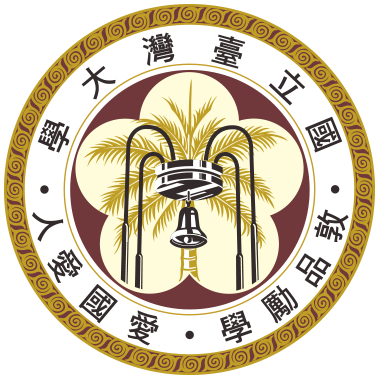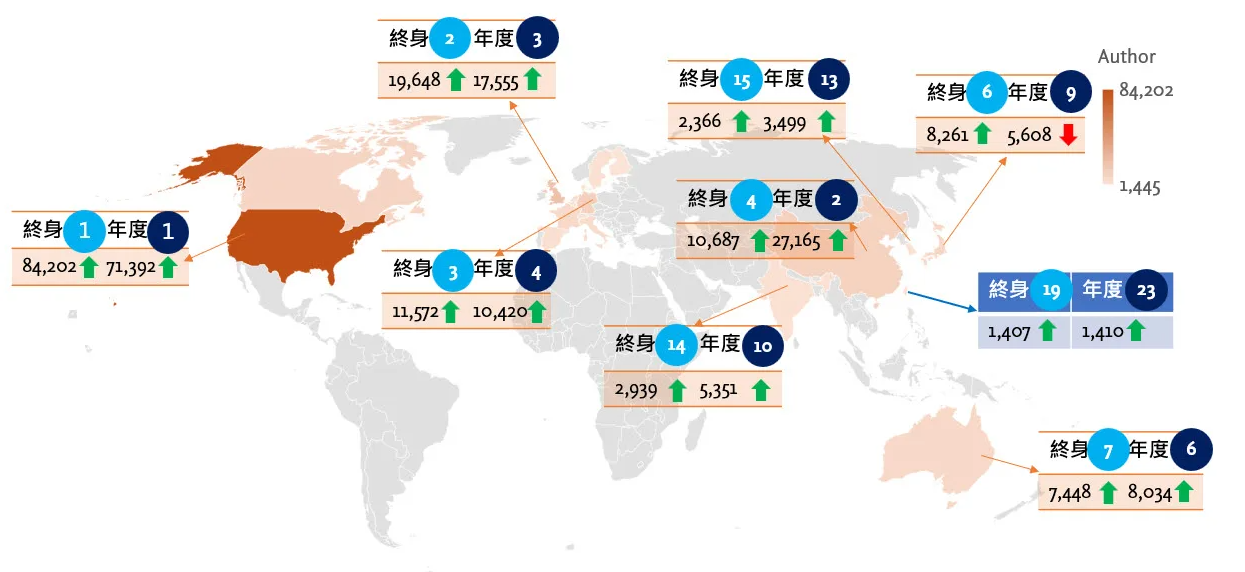Recently, experts from Stanford University released the latest 2024 "World’s Top 2% Scientists" list through Scopus, which is divided into two categories: the "Lifetime Scientific Impact Ranking (1960 - 2023)" and the "Annual Scientific Impact Ranking." These rankings measure scholars' long-term and recent research impact. The data was sourced from the Scopus database as of August 1, 2024, with citation counts accounted for until the end of 2023, covering the time range from 1960 to 2023. The scoring criteria continue to use last year's six key indicators to form a comprehensive score, focusing on overall citation impact and author contributions:
- Total citation count
- Hirsch h-index
- Co-author adjusted Schreiber Hm-index
- Citation count for sole authors
- Citation count for sole or first authors
- Citation count for sole, first, or last authors
Key Highlights for This Year
- The number of scholars listed in the global "Lifetime Scientific Impact Ranking" increased by 6%, while the number from Taiwan rose by 5%.
- The number of scholars in the global "Annual Scientific Impact Ranking" also increased by 6%, but the number from Taiwan decreased by 1%.
- In the "Lifetime Scientific Impact Ranking," among the top 20 countries, China, India, and South Korea all saw growth rates exceeding 10% compared to last year, ranking among the top three in growth.
- In terms of the "Annual Scientific Impact Ranking," China and India had growth rates exceeding 10%, ranking second and third in growth compared to last year, with Saudi Arabia leading at 22%.
In the "Lifetime Scientific Impact Ranking," Taiwan maintained the same number of scholars in Earth and Environmental Sciences, Mathematics and Statistics, and History, while other disciplines saw growth. The top five fields were Clinical Medicine, Engineering, Information and Communication Technology, Social Sciences, Agriculture, Fisheries and Forestry, and Public Health and Services. Clinical Medicine had the most significant increase, rising from 273 to 313 scholars, an increase of 90. Fisheries and Forestry, as well as Public Health and Services, both tied for fifth place, with an increase of 6 scholars.
In the "Annual Scientific Impact Ranking," Taiwan saw the most significant increase in Clinical Medicine, which rose from 336 to 357 scholars, an increase of 21. Social Sciences and Public Health and Services increased by 8 and 5 scholars, respectively. Economics and Business, Earth and Environmental Sciences, Mathematics and Statistics, Architectural Environment and Design, and Communication and Media Studies each increased by 1. Engineering and History remained stable, while other fields declined, with Physics and Astronomy experiencing the most significant drop, falling from 124 to 107 scholars, a decrease of 17.
Both the global lifetime and annual scientific impact rankings saw an increase of 6% compared to last year, with Taiwan's lifetime ranking increasing by 5% and the annual ranking declining by 1%.
The 2024 version released today indicates that the analysis team selected researchers with publication outputs based on Scopus author profiles. The total number of global researchers rose from 9.6 million last year to 10.25 million this year. The number of scholars in the "Lifetime Scientific Impact Ranking" increased from over 204,000 to over 217,000, reflecting a growth rate of about 6%. The "Annual Scientific Impact Ranking" rose from over 210,000 to over 223,000, also with a growth rate of about 6%. The United States holds the top position in both the "Lifetime Scientific Impact Ranking" and the "Annual Scientific Impact Ranking." China ranks fourth globally in the "Lifetime Scientific Impact Ranking" but second in the "Annual Scientific Impact Ranking." Taiwan ranks 19th in the "Lifetime Scientific Impact Ranking" and 23rd in the "Annual Scientific Impact Ranking." This year, Taiwan has 1,759 scholars listed in the "Lifetime Scientific Impact Ranking," which is a 5% increase from last year, while 1,407 scholars are listed in the "Annual Scientific Impact Ranking," a decrease of 1% from last year.


